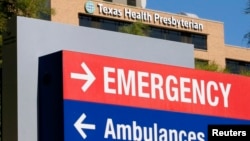The Liberian man who became the first Ebola patient diagnosed in the United States died Wednesday in a Texas hospital, as U.S. officials announced new airport screening measures in a bid to keep the deadly virus from spreading.
Texas Health Presbyterian Hospital said that Thomas Eric Duncan died around 8 a.m. local time, 10 days after he entered the facility and 13 days after hospital workers misdiagnosed his condition.
In the days between Duncan's initial consultation with the hospital and when an ambulance returned with him vomiting, Duncan may have exposed dozens of people to the virus. He apparently picked up the disease while helping an Ebola-infected neighbor in his home country of Liberia.
Duncan, 42, had traveled from Liberia, the epicenter of the West African Ebola outbreak, to Dallas, to attend the high school graduation of his son, who was born in a refugee camp in Ivory Coast. The boy was brought to the U.S. as a toddler when the boy's mother was resettled.
"His son had told his mother, 'I want to see my dad. Can we help my dad to come?' And they fixed his papers to come to this country," said Duncan's brother Wilfred Smallwood, whose son, Oliver, is quarantined with the household where Duncan stayed before he was diagnosed.
Duncan had arrived in the U.S. via Brussels on Sept. 20. He did not exhibit signs of Ebola until several days later, but was initially sent home from the Dallas hospital with antibiotics when he first went there on Sept. 25.
Nearly 3,900 people have died from the disease in West Africa, including more than 2,200 in Liberia, according to the World Health Organization. The total number of cases stands at just over 8,000.
New Screening Measures
In Washington, meanwhile, the White House said new measures will go into place at five U.S. airports that receive over 94 percent of travelers from the worst-hit nations of Guinea, Liberia and Sierra Leone. White House spokesman Josh Earnest said U.S. border guards will begin taking the temperatures of travelers specifically from those three nations.
New York’s JFK International Airport, which received nearly half of travelers from the three West African nations between July 2013 and July 2014, will begin the new screening on Saturday. Four other major international gateways – Atlanta’s Hartsfield-Jackson; Newark, New Jersey; Chicago’s O'Hare; and Washington's Dulles – will begin screenings next week.
Homeland Security Secretary Jeh Johnson said border agents will monitor travelers for “general overt signs of illnesses at all U.S. ports of entry.”
“These expanded screening measures will provide an additional layer of protection to help ensure the risk of Ebola in the United States is minimized,” he said.
The Centers for Disease Control and Prevention, the leading U.S. government health agency, said it was tracking 48 people who had contact or may have had contact with Duncan in the days before he was admitted to the hospital.
Dr. Thomas Frieden, the CDC chief, said as long as the outbreak continues in West Africa, there is a risk for Ebola in the United States
The epidemic is "not just a humanitarian issue or a public health issue, [but] a national security priority,” President Barack Obama said in a conference call with state and local officials.
"We don't have a lot of margin for error," he said, adding that the chance of an Ebola outbreak in the U.S. "remains extremely low."
More Aid
Earlier Wednesday, Secretary of State John Kerry said more countries need to send more resources— money, equipment and staff— to help in the fight against Ebola. Progress is coming far too slowly, he said.
Slideshow from Kerry's presentation
Speaking with British Foreign Secretary Philip Hammond, Kerry also said airlines need to keep flying to West Africa and for borders to remain open to allow for the movement of assistance and medical staff.
The United Nations mission in Liberia said Wednesday a second member of its staff has contracted the disease. The mission said the staff member was undergoing treatment, but did not specify their nationality. Another staff member died last month.
Disease's Cost
The World Bank said the regional impact of the epidemic could reach $32.6 billion by the end of 2015 if it spreads significantly.
“The enormous economic cost of the current outbreak to the affected countries and the world could have been avoided by prudent ongoing investment in health systems-strengthening,” World Bank President Jim Yong Kim said in a statement.
WHO also said there was no evidence the epidemic was being brought under control. The U.N. agency said a reported fall in the number of cases in Liberia reflects under-reporting by overwhelmed health workers.
Duncan was the first person to be diagnosed in the United States; several other U.S. citizens have contracted Ebola while working in Africa and returned to the U.S. for treatment.
In Madrid, meanwhile, a nurse was reported to have Ebola after caring for two Spanish missionaries who were brought to the hospital for treatment. Officials believe she contracted the disease by touching her face with an infected glove.
Material for this report came from AFP, AP and Reuters.











